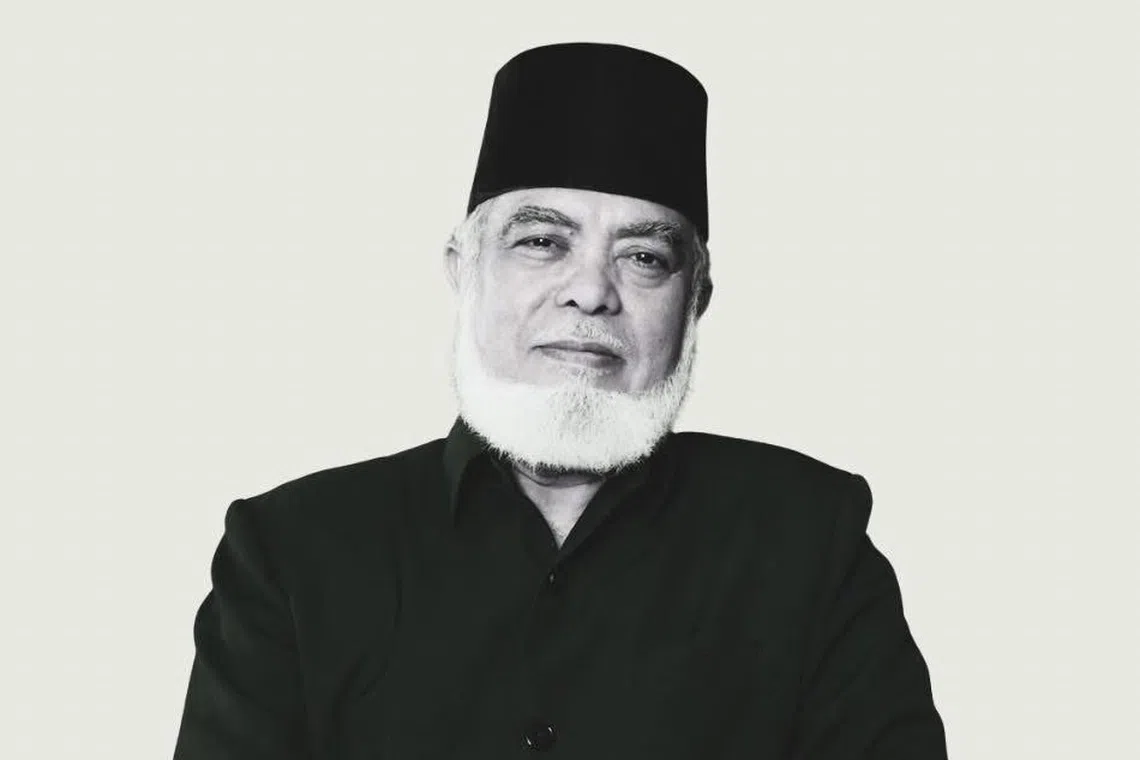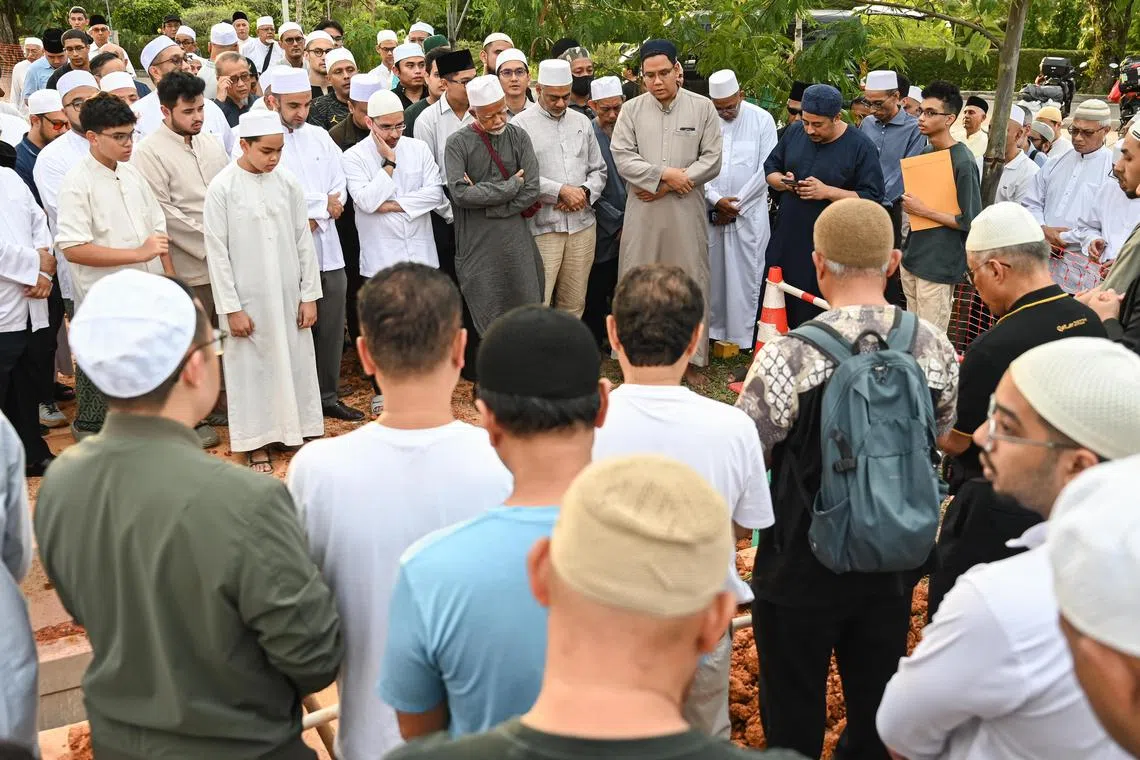Singapore’s second mufti Sheikh Syed Isa Semait dies at age 87
Sign up now: Get ST's newsletters delivered to your inbox

Sheikh Syed Isa Semait was Singapore’s longest-serving mufti.
PHOTO: MUIS
SINGAPORE – Sheikh Syed Isa Semait, Singapore’s longest-serving mufti, died on July 7 at the age of 87.
The Republic’s second mufti, he served in the role for almost four decades, beginning in 1972, when he took over the role from former Syariah Court president Sanusi Mahmood.
In 2011, he was succeeded by Dr Fatris Bakaram, who served as mufti until 2020.
The mufti is Singapore’s highest Islamic authority, overseeing key religious rulings for Muslims here.
Sheikh Syed Isa’s funeral prayer, held at the Sultan Mosque, was led by Habib Hassan Al-Attas, the imam of Ba’alwie Mosque.
Among those who visited Sultan Mosque to pay their last respects were Prime Minister Lawrence Wong and Senior Minister Lee Hsien Loong.
In posts on his social media accounts, PM Wong described Sheikh Syed Isa as a “tireless champion for social harmony”, noting he was a life member and former president of the Inter-Religious Organisation, and had served on both the Presidential Council for Religious Harmony and the Presidential Council for Minority Rights.
“He actively promoted inter-faith engagement, and worked to build cohesion and trust among Singaporeans of all races and religions,” he said.
“He was a pillar not just of the Singapore Muslim community but also of our nation. His legacy will live on through the many generations of religious teachers, scholars and Singaporeans whose lives he mentored and touched,” PM Wong said.

Mourners attending the funeral of Singapore’s second mufti, Sheikh Syed Isa Semait, at Choa Chu Kang Muslim Cemetery on July 7.
PHOTO: BERITA HARIAN
Speaking to the media at the mosque, SM Lee described Sheikh Syed Isa as a “great Singaporean” who had played many roles over the years.
SM Lee said he first met Sheikh Syed Isa in 1988, when the former mufti discussed the issue of group representation constituencies – when the proposal to create these GRCs to ensure minority representation in Parliament was being deliberated – with a Select Committee that Mr Lee sat on.
“He understood what it took to make Singapore a harmonious society, where the religious minority could be able to live with their own space, and in harmony with the other groups,” he said.
In a statement to the media, the Islamic Religious Council of Singapore (Muis) described Sheikh Syed Isa’s death as a “great loss to the Singapore Muslim community and the nation”, noting he had helped set up many key institutions surrounding the religious life of the community here.
These included establishing the use of astronomical calculations to determine Islamic calendar dates, as well as institutionalising the collection and disbursement of zakat, the annual tithe paid by Muslims to help the needy.
“He also oversaw the management and growth of our wakaf properties and the establishment of an internationally credible and reliable halal certification system,” Muis said.
Wakaf refers to Muslim endowments for religious and charitable purposes.
As mufti, Sheikh Syed Isa led the Fatwa Committee – a panel of top Islamic scholars here which issues religious rulings – to work out solutions for challenging and contentious issues concerning Singapore’s Muslim community.
One difficult issue he dealt with was the inclusion of Muslims under the Human Organ Transplant Act (Hota), with Muis noting Sheikh Syed Isa was able to “rally the authorities and community to accept a unique solution for the community” before Muslims were fully included under the Hota system in 2007.
“In addition, Sheikh Syed Isa also led efforts to deal with the arrest of the Jemaah Islamiyah groups and supported the effort to establish the Religious Rehabilitation Group in rehabilitating the detainees and their family, among many others,” the council said.
“His unwavering commitment and tireless efforts to promote a confident and progressive Muslim community have left a lasting impact on Singapore and beyond.”
A book on the former mufti’s life, titled Keeping The Faith: Syed Isa Semait – Mufti Of Singapore (1972-2010), was published by Straits Times Press in 2012, detailing his varied contributions to Singapore.
It also recounts how he had worked various jobs while studying in Egypt, including as a welder, before returning to serve in the Syariah Court. He reluctantly became Singapore’s chief Islamic scholar at age 33.
Acting Minister-in-charge of Muslim Affairs Faishal Ibrahim was among the congregation for the funeral prayer, together with his predecessors, Social and Family Development Minister Masagos Zulkifli and former Cabinet minister Yaacob Ibrahim.
“His calm scholarship, deep understanding of Islamic jurisprudence, and humility laid the foundation for a confident, progressive and inclusive Muslim community,” said Associate Professor Faishal in social media posts.
“His passing is a profound loss not only to the Muslim community, but to Singapore as a whole. His legacy will continue through the institutions he helped build and the generations he inspired, including through the Syed Isa Semait Scholarship, which nurtures future asatizah (religious teacher) leaders,” he added.
Mr Masagos – who served as minister-in-charge of Muslim affairs from 2018 until May 2025 –recalled how, when he was still new to the Muis Council, the former mufti left an impression on him with his “kindness and gentle guidance”.
“At the time, I only knew of him through the controversies and the resistance some in the community had towards the fatwas and official guidance he issued. But behind those headlines, I came to know a very different man,” said the minister.
“What left the deepest impression on me was his unwavering resolve – to always do what was right and good for the community, even when it was difficult or unpopular. That quiet courage continues to inspire me to this day,” he said in a social media post.
Singapore’s current Mufti, Dr Nazirudin Mohd Nasir, said that while the former mufti had faced many challenges over almost four decades in the role, he persevered for the good of the community, without seeking reward or recognition for his contributions.
Dr Fatris, the former mufti who was Sheikh Syed Isa’s direct successor, described him as a father figure whose advice and guidance he benefited from.
While the late mufti may no longer be well-known to the current generation of Muslims, they continue to benefit from his legacy, Dr Fatris said.



